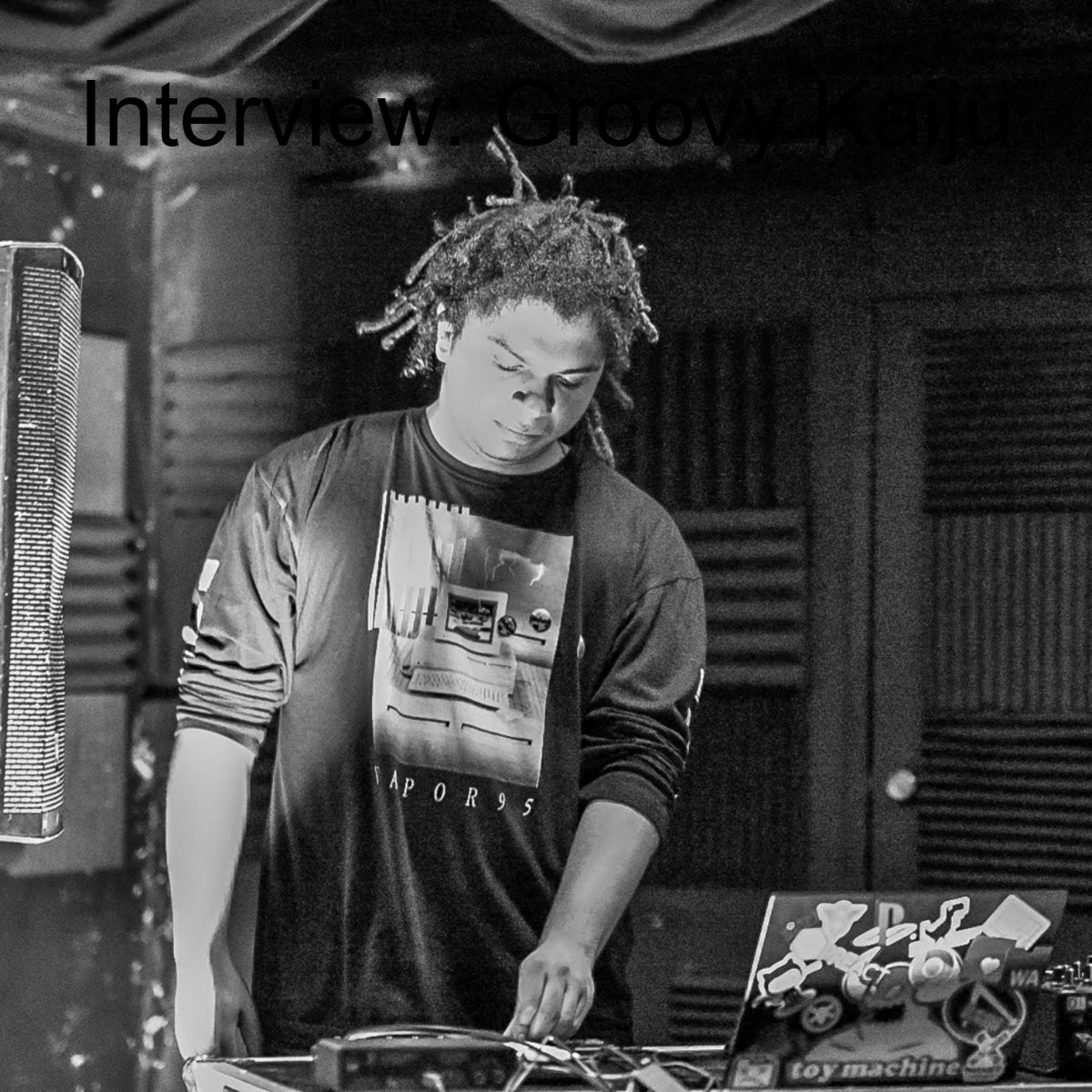
Classics Album Review
Godzilla’s Summer Vacation
by: Groovy Kaiju
Written By: BigFingerRo
Published On: July 23rd, 2021
As the name of this “review” might send some into a spiral of rather tiresome and nonconstructive thoughts about popular music (not in any particular genre, but the kinda thing that gets put in the radio and constantly repeated would come to mind first), it shall be prefaced with this: This review has nothing to say about the commercial appeal of one genre or song over the other, or the reasons for it. The discerning listener already knows what those may be, and the vices of the industry that engender that situation to a greater or lesser degree. And a non-discerning listener might find that the topic mentioned before is too big to fit completely here. Furthermore, the same goes for the validity of transformative works. It’s a somewhat outdated debate, too broad for this space.
Some time ago, I was on a train ride with some acquaintances. I had only discovered future funk and some of the genres with similar interests a few months before, and I was completely sold on them. So much that I even tried making a song! (which, sadly, led nowhere but frustration and an unused Fruity Loops .exe). One of those acquaintances was a digital artist like me, but came from a more musical background. His dad was a musician, and his mom was a producer. And he was telling us about a new album that had come out, which reminded me of my most recent discovery, which happened to be Groovy Godzilla’s Godzilla’s Summer Vacation. I started telling him about it, and I played “Beach Vibes” from my phone for him to listen to.

Immediately, my friend took off the headphones and told me “Hey, this is just a remix!” This upset me slightly, and after a bit of arguing, my friend said “How could something that requires no skill be honest?” This was in response to my original “pitch” of the album, which was “I really like how honestly happy it sounds”. As he went on, he said that something produced electronically, that didn’t require using a guitar or really, any instrument, couldn’t possibly hope to be as honest as I said.
I dropped the argument but the question stayed with me, and became more questions. How did he decide this required no skill so quickly? And why did this make the emotions the album tried to convey (at least, as I perceived them) fake? It seemed nonsensical. Later that day, in a book I was reading on the fundamentals of art, I read that one learns the technical aspects of art to accurately represent what one wants to. And I realized that perhaps my friend was confusing accuracy with honesty.
As is well known, there is a conception that digital mediums allow one to “cheat”; to skip over parts of traditional mediums that are seen as essential to them (or at least, essential to achieve a certain level of quality), like mixing paint for oil painting, or developing pictures for photography. And in skipping these essential parts, one is somehow fooling the audience and thus losing the “right” to expression in that medium. For someone in this mindset, digital mediums exist exclusively to cheat.
The more egregious part of this mindset, however, is that it calls into question the sincerity of the emotions the artist tried to convey. It’s the logical conclusion: If one wanted to express themselves accurately (which, again, is a concept easily confused with honesty) would it not be a disservice to “cheat”? Is the intensity or clarity of the emotions one wants to convey muddled by the chosen medium? What if the whole point of the work is to renovate an old emotion, an old mood?
Which brings us to the album in question. I’d like to offer a disclaimer at this point: I know next to nothing about music. I played bass for a bit, and still do, but the technical intricacies and subtleties of music are more often than not lost on me. But I do know a bit more about art, and have encountered some people who’d have the same opinion of art (moreso in a digital medium) as my friend did of “remixes”, which is a term far too reductive and simple to describe this album.
This album’s greatest achievement is, simply put, having captured a perfect snapshot of a summer vacation. And by doing so, it not only renovates the memory, it engenders fondness for something one might not have ever even experienced. For example: One has never had the tradition to go to a certain place every summer. Sure, one may have been on a summer vacation before, but that specific experience might be alien to them. Somewhat familiar, from seeing it in movies and such, but not from direct experience.
And here is where the honesty mentioned earlier comes into play. For someone who has experienced it, the experience holds a special place in their memory. This allows them to create a crisp, perfectly clear image of what those moments were like, which is perceived with the same clarity by the listener even if they’ve never experienced something like it. It’s immersive, in a way. And something so clear, something so genuine, simply can’t be “faked”.
Groovy G’s masterful mixing, honest-to-goodness appreciation for the songs sampled — and of course, funky, modern beats — do a great job of recontextualizing the songs used. They become part of this snapshot: every beach episode in a cartoon, every cannonball into a pool, every memory of a great summer as a kid. That feeling of the innocent, simple joy of a summer vacation on the beach is captured perfectly here.
So, without further ado, and with plenty of sunscreen on our shoulders and faces, this is Groovy Godzilla’s Godzilla’s Summer Vacation:
First Day of Summer
A great opener to a great experience. The song is relentlessly upbeat and has a bombastic brass section. It moves really fast, perfectly capturing that magic moment when the bell rings on the last day of school and everyone rushes to the exit as fast as humanly possible. The pitch-shifted lyrics lend a juvenile taste to the piece, further cementing the feel of an excited, youthful beginning to some truly carefree days.
Jukebox Jams
The logical next step from the frenzied excitement of the previous song. This song aims to capture the day after. Or rather, the morning after. The moment in which one wakes up, perhaps even at the usual time for school, only to realize it’s summer vacation, and one gets to take their time and enjoy their morning to the fullest. The picture of a crisp sunrise light coming in through the kitchen window, with a cup of coffee on hand comes to mind. This is a slightly less juvenile part of the snapshot, but still an essential part of it, as it finishes settling the idea of “vacation” in one’s mind.
Beach Vibes
One of Groovy G’s best known works. Personal favourite. Arguably the crown jewel of the album. Perfectly captures the mood of every beach episode on anything, that moment of arrival at the first stop of a vacation. One can almost smell the artificial coconut and plastic smell of every beach store ever. The intro in particular, with that musical phrase that evolves later in the song, captures the mood perfectly. The kirby sound effect almost makes the song cloyingly sweet, were it not for a very strong bassline.
How Romantic
Following the progression of events, we now reach the meetup with that special childhood friend. So far this progression has been almost stereotypical, but once again the sincerity with which it is explored transforms it from a simple stereotype to one of those tales as old as time. The vocals of the song and harmony of the voice bring to mind the way one might find themselves crushing for this friend, suddenly realizing their voice is sweeter somehow or that they have really pretty eyes. The guitar after the DB sample makes sure we stay on track groove-wise, so as to not come off as too sweet.
One for the Kids
This one I struggle slightly to place in the timeline. The mood, while still very laid back and joyful, has a distinctly more retro feel to it thanks to the saturation on the vocal section. I wouldn’t call it bad, as it still fits within the general mood of the album, but I do think it’s the weakest of the tracks. Perhaps this is intentional: The mix of retro and modern sound tropes, with a beat that’s not as upbeat as the album’s opening but not as slow as Beach Vibes, makes one think of riding around with friends with the top down.
When I Fell for You
The party. Definitely the most rhythmic song of the album. The beginning is somewhat reminiscent of Garibaldi. The vocals sound slightly like someone confessing a secret to the audience, fitting the narrative, as perhaps the moment in which one tells a friend about the weird new feelings they experienced in Beach Vibes. The guitar solo at the end does a great job to bring the song and the event to a climax, as well as to bring us back into the party.
Warm Memories
Definitely the album’s classiest song. The title is slightly misleading, as it’s also the least happy song in the album. While not losing the groove the album has maintained so far, the album seems to have reached its peak speed-wise in the last song, and is now settling in as if to signal the coming end of summer. Perhaps the gloominess of the lyrics is meant to signal this as well. In the narrative that’s been built so far, perhaps this is a moment of hesitation on whether the childhood friend would correspond to those feelings, or perhaps an outright rejection.
Till Next Year
And so we reach the end of summer. Where the snapshot of these memories becomes the perfect, crystal clear snapshot of life this album is. By far the most heartfelt song, declaring one’s unbreakable love for the other — but by proxy, declaring one’s fondness for these memories.
And in bringing this review to an end, this song states the whole point of the album: These memories are one’s happy place. The space in one’s mind where problems don’t exist. The space one shares with everyone who was involved with these memories. And so, the album closes by reminding the listener that this space never disappears. One will always have this place to come back to. And so, even if things seem hopeless, even if everything else seems bleak, there’s always that promise of returning. So one’s hope is renewed, and life seems better, and one vows to stay groovy until we meet again. Until next year.
Groovy Kaiju
Get The Album!
Written By:
Copy Editing By: Cerulea_d.lux


